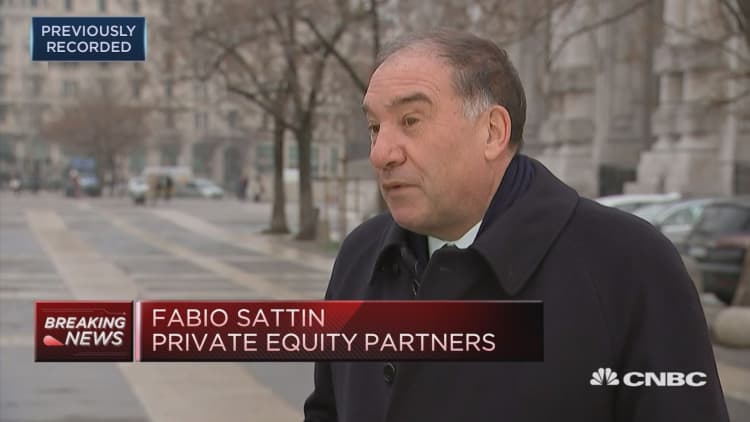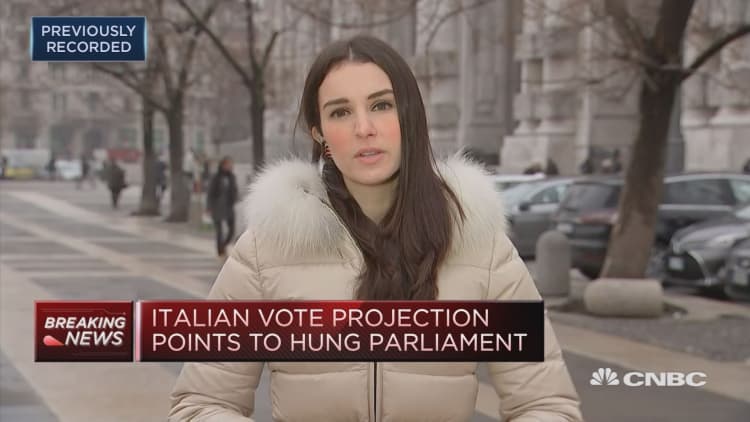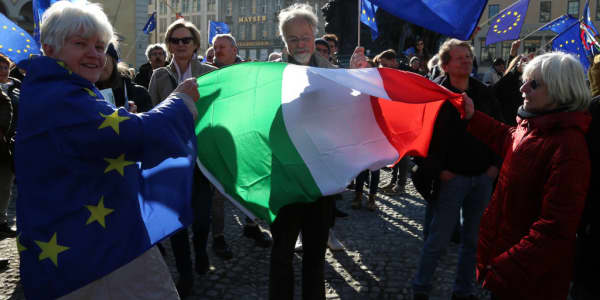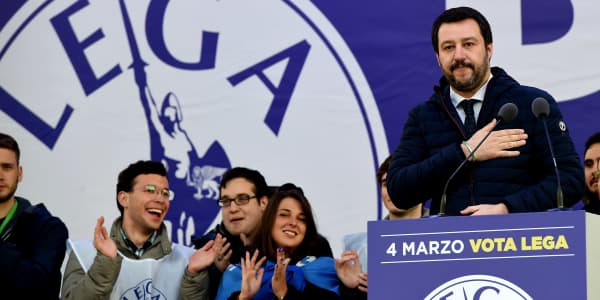The leader of Italy's right-wing Lega (League) party said the center-right coalition, which won the largest share of the vote but not a majority, has the "right and duty" to govern the country.
Lega leader Matteo Salvini, the man of the moment given his party's election gains (mainly in northern Italy, the party's traditional heartland), said Monday that he is willing to talk to all parties but ruled out a broad coalition with the anti-establishment Five Star Movement (M5S).
"We have a right and duty to govern," he said, according to Reuters. "The center-right coalition has won and can govern."
This center-right alliance got more votes as a group, but M5S emerged as the largest single party in Sunday's parliamentary election. Neither got enough votes to govern alone, however, which will likely lead to a period of political uncertainty in Italy.
The result — a hung parliament — means negotiations will have to begin between the major parties to see if a coalition deal can be reached. M5S has always ruled out doing a deal, although party leader Luigi Di Maio told CNBC in February he was willing to hold talks with other parties.
Like Salvini, the leader of M5S said the movement takes its responsibility seriously and that the party was ready to govern. He too said he was open to talking to other parties and that his party represented the entire nation, "which leads inevitably to government," Di Maio said, Reuters reported.
'Leader of the center-right coalition'
Meanwhile, Salvini said the Lega party is now "the leader of the center-right coalition" and said he wants Italy to "form a stable government for the benefit of Italy and Europe."
Yet, after what has been seen as a protest vote in which anti-establishment parties performed well against the "old guard" of Forza Italia and the Democratic Party (PD), Salvini said the party would remain populist.

"I am and will remain proudly populist," Salvini added, but said holding a referendum on the euro was "unthinkable."
He repeated his opinion that the euro "was, is, and remains a mistake" and added that Europe must be rebuilt around people, rather than bureaucracy, signaling that the party could play tough with its European neighbors.
The election on March 4 saw the center-right bloc, which also includes former Prime Minister Silvio Berlusconi Forza Italia's party, win a large share of the vote — 36.9 percent according to early government figures. The Five Star Movement was the most popular singular party with 32 percent of the vote. The ruling Democratic Party fared badly in comparison, with 23 percent of the vote.

Surprisingly, the anti-immigration, euroskeptic Lega party gained more votes than Berlusconi's Forza Italia, meaning it will have more influence in the center-right coalition that could govern. While Lega gained 17.6 percent of the vote, Forza Italia had 14 percent, according to the early results.
Lega and M5S
Economists and strategists have already started looking at the possible outcomes to negotiations although weeks of talks are likely to lie ahead.
J.P. Morgan economist Marco Protopapa said Monday that M5S and the League (formerly the Northern League, or NL) were "the real winners of the election" and that analysts would be closely watching the parties from now on.
"These results do not leave any room for centrist coalitions (hard to call them grand given the meager numbers). Moreover, the combined over-performance of M5S and NL has created a paper majority for a full non-mainstream government as a result of a potential coalition between these two parties (this combination looked a very remote tail risk on the basis of the pre-election polls)," he said.
Lega is certainly expected to be pivotal in negotiations and BlackRock's Global Chief Investment Strategist Richard Turnill said Monday that Lega would not like to be a junior partner in any coalition.
"We believe it unlikely that M5S will partner with Lega to form a government. Lega's ambition is to lead the center-right coalition rather than be a junior partner in an unstable alliance with M5S," Turnhill said in a note.
"At some point, an increasingly mainstream M5S and the center-left Democratic Party may warm up to each other. A new Italian parliament needs to be convened by March 23, yet negotiations are likely to drag on beyond then. Political noise is poised to remain high until a sustainable coalition emerges," he said.





